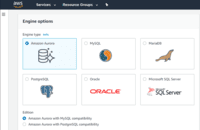Overview
What is Amazon Aurora?
Amazon Aurora is a global-scale relational database service built for the cloud with full MySQL and PostgreSQL compatibility.
Recent Reviews
Awards
Products that are considered exceptional by their customers based on a variety of criteria win TrustRadius awards. Learn more about the types of TrustRadius awards to make the best purchase decision. More about TrustRadius Awards
Popular Features
- Automated backups (25)9.494%
- Database scalability (26)9.494%
- Automatic software patching (26)8.989%
- Monitoring and metrics (25)8.787%
Reviewer Pros & Cons
Features
Return to navigation
Service Offering Details
- About
- Integrations
- Competitors
- Tech Details
- FAQs
What is Amazon Aurora?
Amazon Aurora is a MySQL and PostgreSQL-compatible relational database built for the cloud, built to combine the performance and availability of enterprise databases with the simplicity and cost-effectiveness of open source databases. The vendor states Amazon Aurora is up to 5X faster than MySQL databases and 3X faster than PostgreSQL databases, and that it provides the security, availability, and reliability of commercial databases at 1/10th the cost.
Amazon Aurora features a distributed, fault-tolerant, self-healing storage system that auto-scales up to 64TB per database instance. It delivers performance and availability with up to 15 low-latency read replicas, point-in-time recovery, continuous backup to Amazon S3, and replication across three Availability Zones (AZs).
The vendor invites readers to learn more details on how they designed Amazon Aurora, from AWS CTO, Werner Vogels.
Amazon Aurora features a distributed, fault-tolerant, self-healing storage system that auto-scales up to 64TB per database instance. It delivers performance and availability with up to 15 low-latency read replicas, point-in-time recovery, continuous backup to Amazon S3, and replication across three Availability Zones (AZs).
The vendor invites readers to learn more details on how they designed Amazon Aurora, from AWS CTO, Werner Vogels.
Amazon Aurora Screenshots
Amazon Aurora Videos
How to create a first database cluster on Amazon Aurora.
What's new in Amazon Aurora
Amazon Aurora Supported Products
Amazon Aurora Competitors
Amazon Aurora Availability
| Geography | NAMER, EMEA, APAC, LATAM |
|---|---|
| Supported Languages | English, French, Chinese, Korean, Japanese |
Frequently Asked Questions
Amazon Aurora is a global-scale relational database service built for the cloud with full MySQL and PostgreSQL compatibility.
Reviewers rate Database scalability and Automated backups highest, with a score of 9.4.
The most common users of Amazon Aurora are from Mid-sized Companies (51-1,000 employees).











